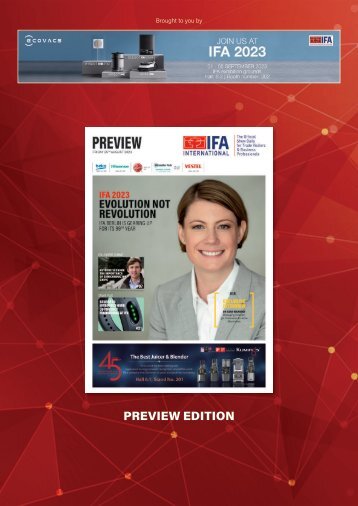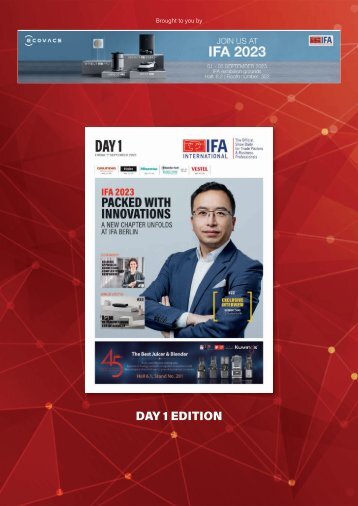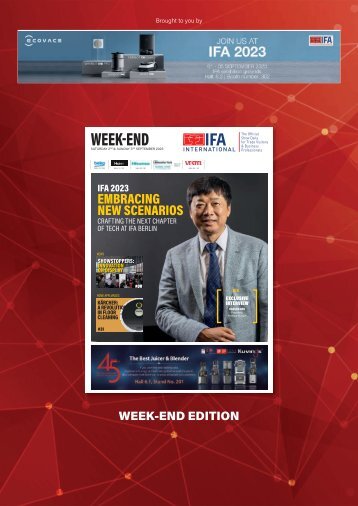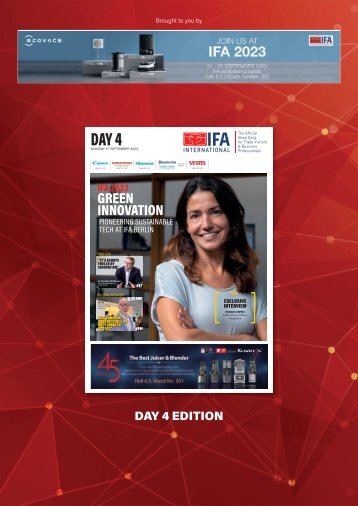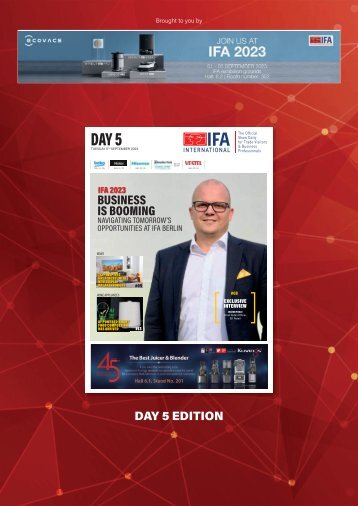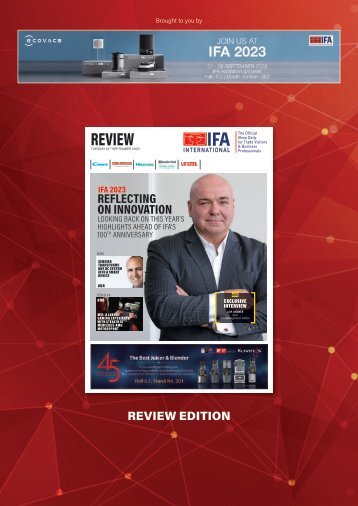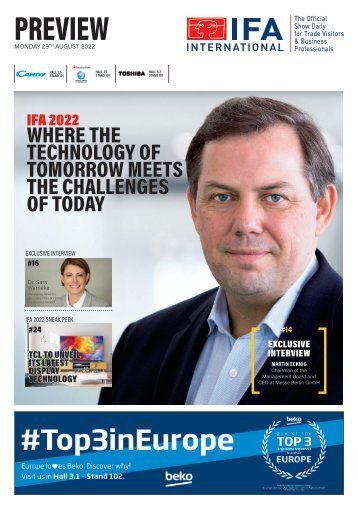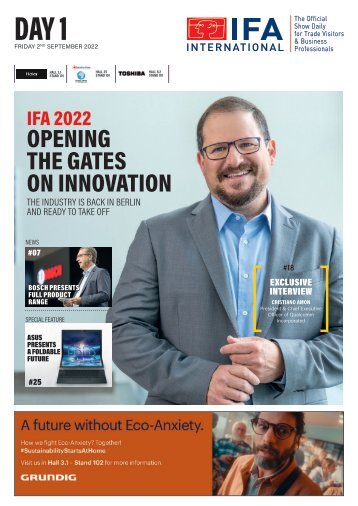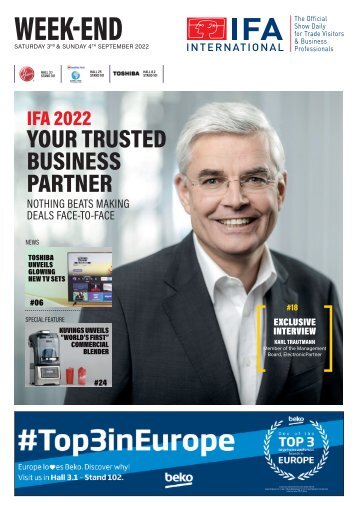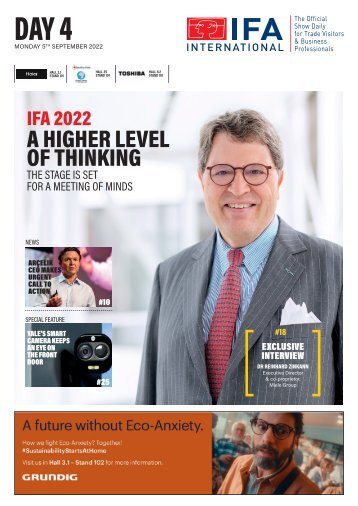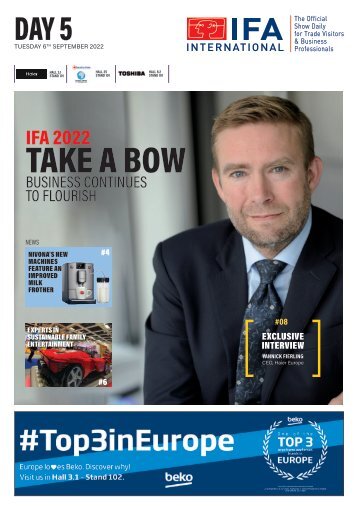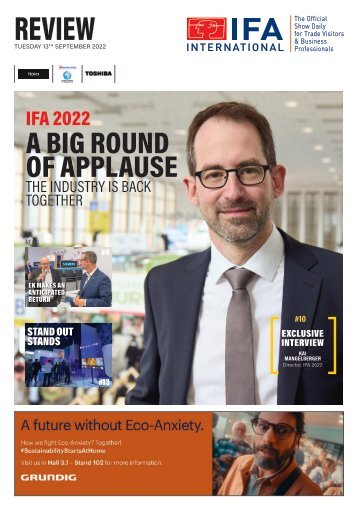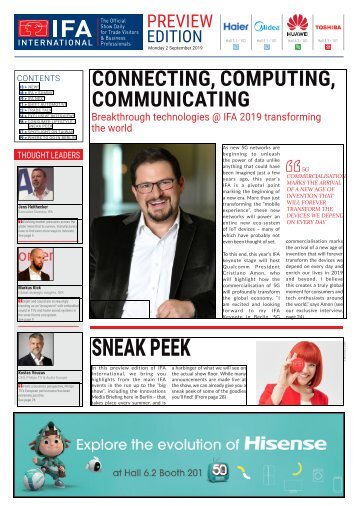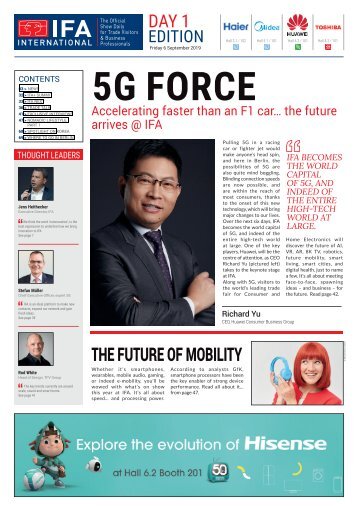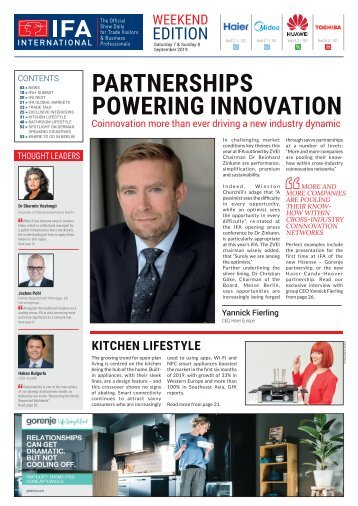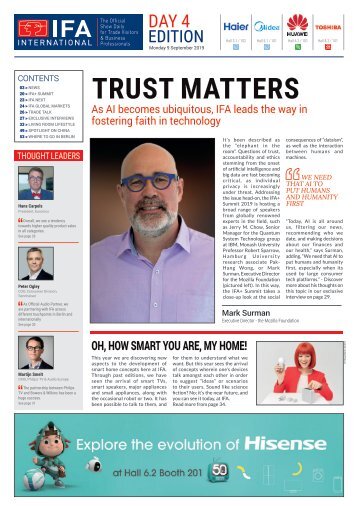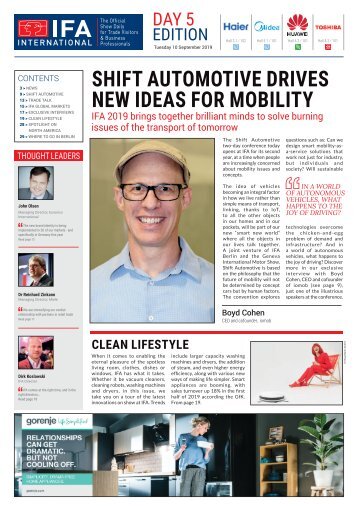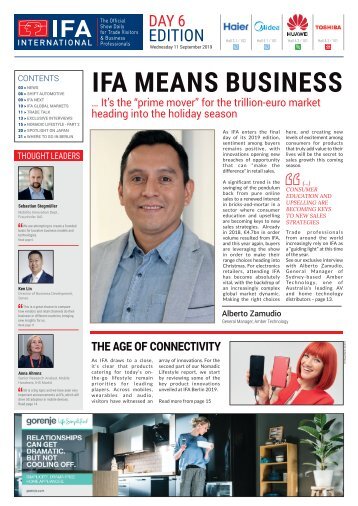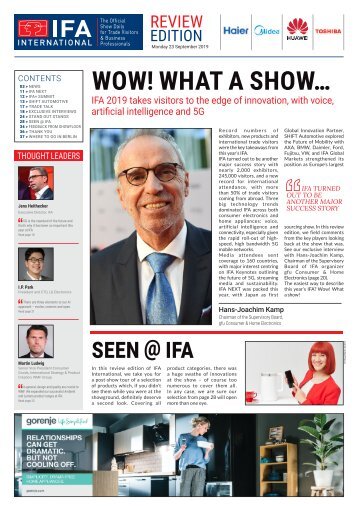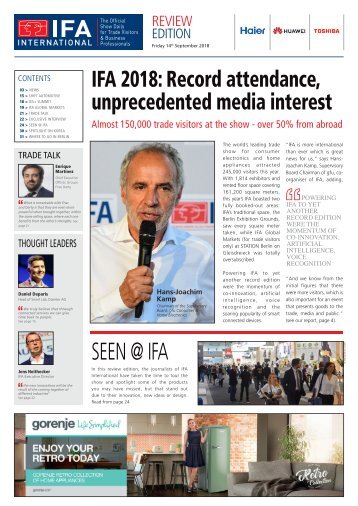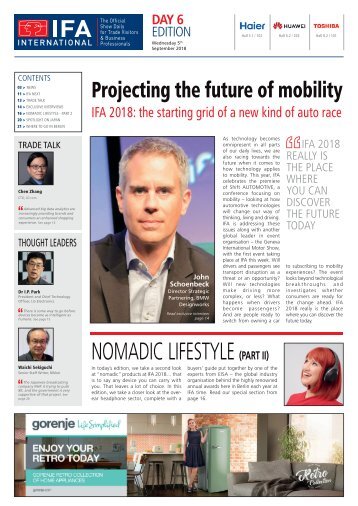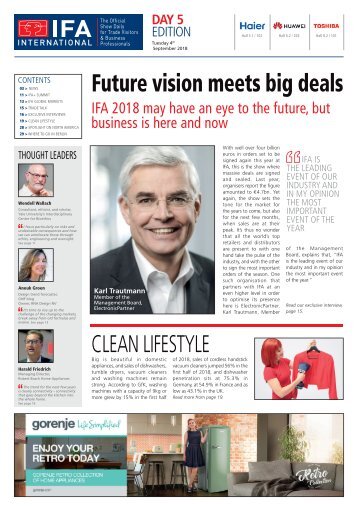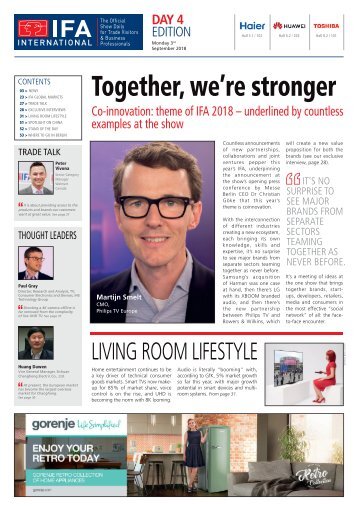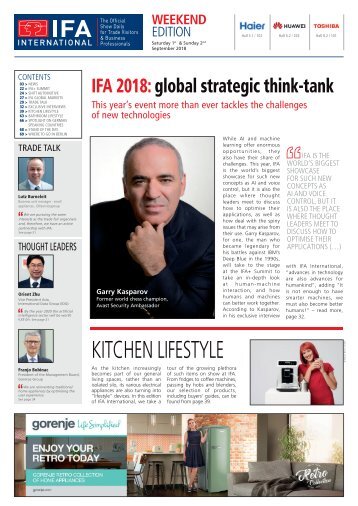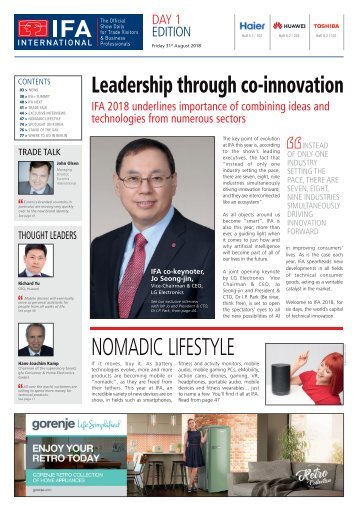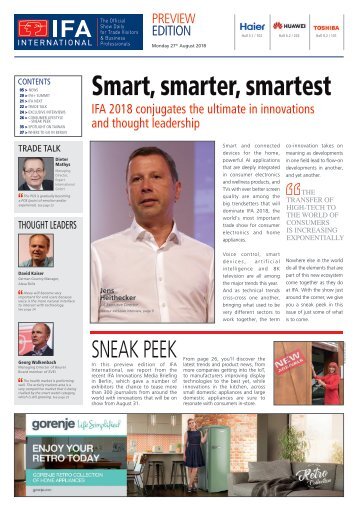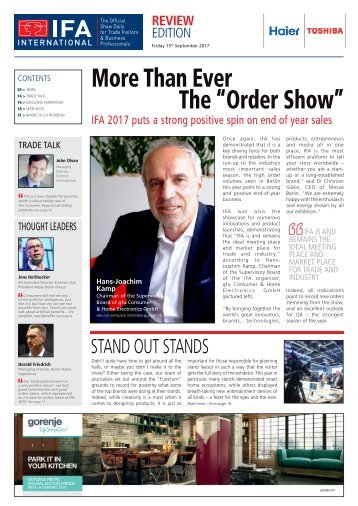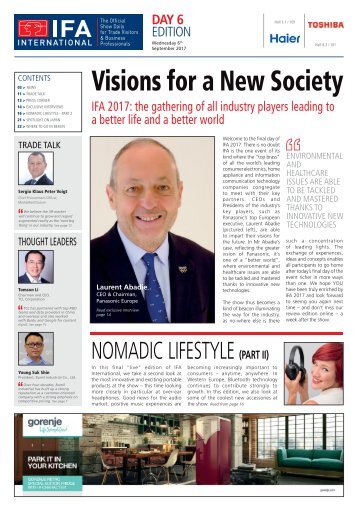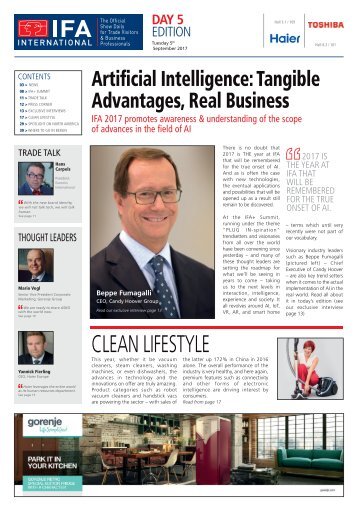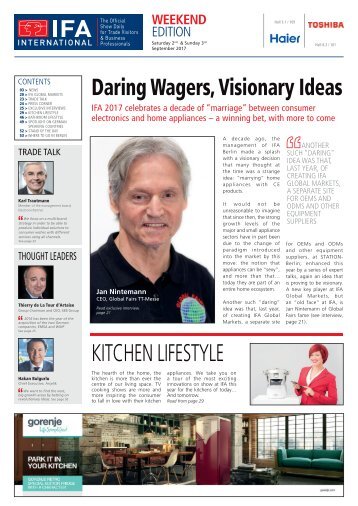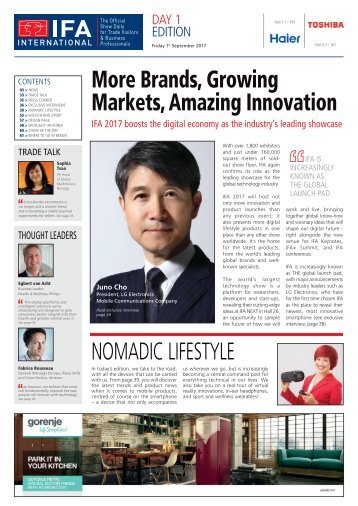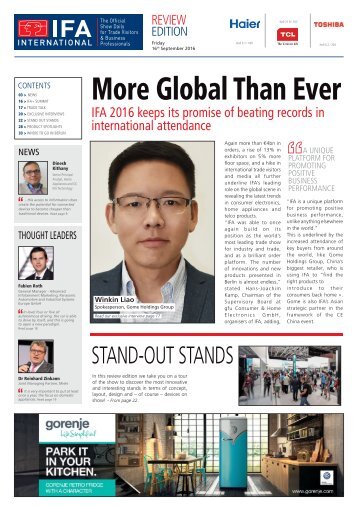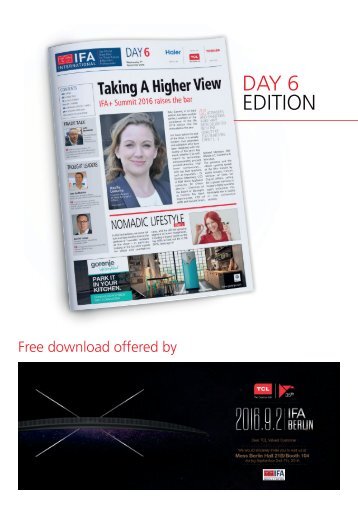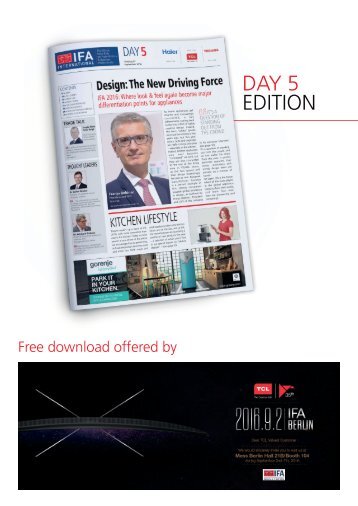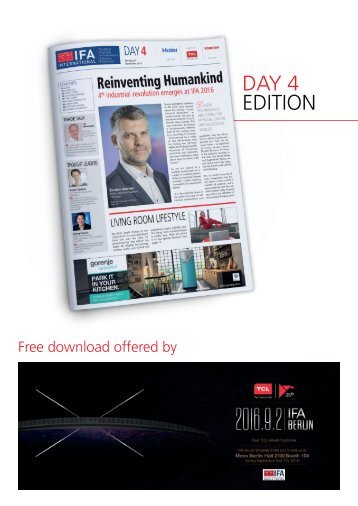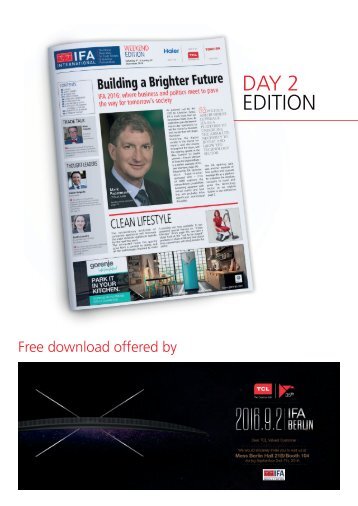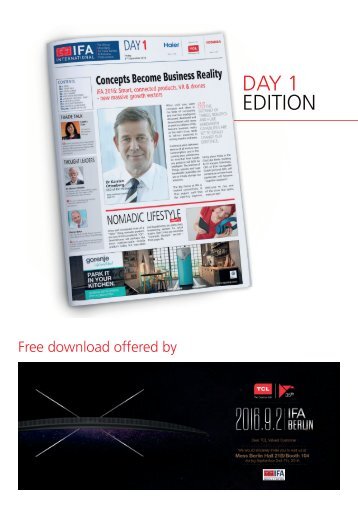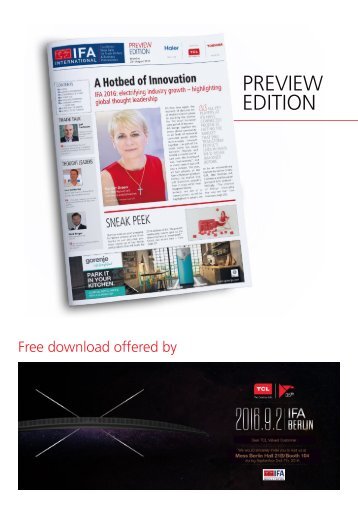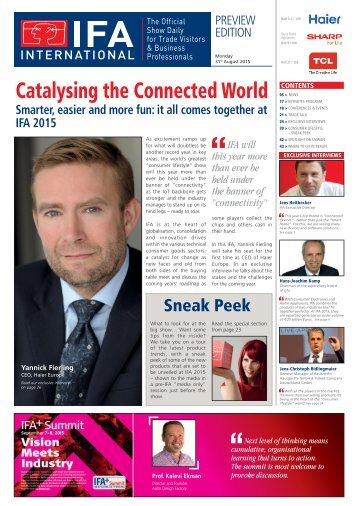
Day 5 - IFA International
- Text
- Digital
- Berlin
- September
- Consumer
- Products
- Trends
- Consumers
- Garmin
- Content
- Panel
- Www.cleverdis.com
DESIGN IS EVERYTHING*
DESIGN IS EVERYTHING* “Design” is a great word. Whether in engineering or in creative endeavours, as a verb, “to design” refers to the process of originating and developing a plan. Designing a marketing/communication campaign can often be even more important than the design of the product itself as sales reps and consumers are bombarded with an overload of conflicting information. We at Cleverdis therefore hold the belief that the growth of the CE Industry today will be increasingly dependent upon INFORMATION DESIGN. Through information design, presented in the form of Cleverdis SPECIALreports, many of the world’s top CE companies benefit from the fact that we are able to put information into perspective for a market that hungers for newfound clarity and simplicity. IFA has this year chosen Cleverdis as the “information designer” of IFA INTERNATIONAL, the official English language daily magazine for the show. Find our more on www.cleverdis.com. *According to wikipedia: Information design has been defined as the art and science of preparing information so that it can be used by human beings with efficiency and effectiveness. Information Intelligence
MEET THE VISIONARIES Markets, Models & Meta-Value in C.E. Interview / George Bailey - General Manager, IBM Global Electronics Industry. As one of IBM's leading thinkers in consumer electronics, you may find George Bailey on television, riffing on business and strategic change on programs like CNBC's "Power Lunch." His book, "Irresistible! Markets, Models and Meta Value in Consumer Electronics," (PrenticeHall) is garnering acclaim and carrying him to global destinations from Sweden to Osaka. IBM has released the findings of a global consumer survey that shows the TV and the Internet are truly on equal footing as entertainment sources. In our preview edition, we included a “pre-show interview with George Bailey (General Manager, IBM Global Electronics Industry). Having the pleasure of meeting with Mr Bailey here at the IFA, we asked him whether all this suffering has to go on… There’s a general lack of collaboration across the CE sector and it’s clear that doing R&D in-house is just too expensive these days. The style of collaboration that we’re starting to see between Sony and Toshiba is a model for the future. Otherwise investment capital will not be forthcoming and that would be a disaster for a lot of companies. It’s important to regard the CE industry as an ecosystem and treat it as such, working together for the good of the whole. As a senior manager at IBM you are in a privileged position. Engaged but not actually involved in the day to day fight for consumer dollars. How do you see the current situation? It’s true that I get a real sense of emerging trends because IBM does not produce consumer products and neither do we intend to. However, our plan is that everything consumers buy will include something that we’ve produced. Our chips are in both the PS3 and Xbox and we provide engineering expertise, consulting input and business strategies to many clients. I see the whole industry and for sure there’ll be a dramatic shakeout with some big names perhaps disappearing. Can you explain how IBM manages to be everywhere and nowhere at the same time. It’s a huge company that maintains a low profile. Why is this? I started my career in strategy consulting and as a consultant you never want your name involved. What you want is for the client to be successful and to get the credit. Our job is problem solving and our lack of visibility avoids conflicts of interest. HP is an example of a company that would like to be more engaged with other companies in the way we are, but who also wants to compete and that’s why a lot of people don’t trust them. What are IBM’s core values and how do they apply to the modern market place? We believe in innovation that matters. By that I mean that the number of patents a company registers is not the point. The point is to provide products that enhance the client’s quality of life. It’s the only way to up your brand equity. We also believe in fostering trust and a sense of personal responsibility. IBM employees from the bottom up are engaged and involved in moving the company forward. The electronics industry is a fascinating one with myriad challenges, many of which could be solved by greater collaboration. It’s something that IBM had to learn because historically we stood alone. Collaboration is something that we had to learn. We’ve done that, partly through outsourcing manufacturing, and partly by sharing R&D costs. When you see that our profits are rising by 6% but our R&D costs are rising by 12 %, there’s clearly plenty to be done in terms of rationalizing new product development. Business partners such as SAP in the semiconductor industry are very important to us. What is your take on the quality of upper management across the CE industry? In the same way that no single company has the monopoly on the best ideas, the people who have the best ideas are not always the ones who should be making decisions. I’m a believer in creating local centres of excellence so that innovations and decisions have a local touch. And looking beyond that, in order to serve clients and consumers in the best possible way, it’s also important to be totally pragmatic when making decisions about outsourcing. You have to go wherever is best. Can you give us some examples of locally inspired innovation? Well the most popular cellphone in India is the one that first offered Tamil, Hindi and English language options. It sounds pretty obvious but someone had to do it first. Another brilliant innovation for the Indian market was by Motorola who produced a phone re-charger that works on a dynamo attached to a bike. An idea like this is an example of genuine local insight that provides huge benefits to the consumer. Finally, tell us how you see the industry developing and changing in the short to medium term… Well I don’t see flat screen TVs continuing to get bigger and bigger. If they carry on at current rates of development, people will be able to buy TVs the size of the screen in Times Square in ten years, but who is going to re-build their house to accommodate them? We are undeniably in an exciting era but there will be some hard decisions being made by CE companies. Particularly some of the major Japanese brands who have been losing market share and brand equity for some time now. They need to decide what their core competences are and drop the rest. Consumers are having a great time at the moment because prices are low and innovation is very high. However, return on investment is very low and this needs to be addressed. The other main issue is that the industry will be increasingly software-driven and people-centric. Traditionally the CE industry hasn’t been good at ‘people’ and this has to change. IFA International • Tuesday, 4 th September 2007 13
- Page 1: international Official Daily News S
- Page 4 and 5: Evolving gently with time… The Ul
- Page 6 and 7: NEWS Europe Leads World in IPTV Sol
- Page 8 and 9: MARKET & TECHNOLOGY TRENDS DisplayS
- Page 11: MEET THE VISIONARIES Exclusive inte
- Page 17 and 18: PRODUCT TRENDS Scorpions Drummer He
- Page 19: PRODUCT TRENDS Convergence becomes
- Page 23 and 24: PRODUCT TRENDS VIDEO Sharp's new Aq
- Page 25 and 26: TRADE NEWS Panasonic & The Olympic
- Page 27 and 28: TRADE NEWS Product Centric Communic
- Page 29 and 30: GOING OUT Where to go Berlin is one
Inappropriate
Loading...
Mail this publication
Loading...
Embed
Loading...

IFA International
- IFA International 2023
- IFA International 2022
- IFA International 2020
- IFA International 2019
- IFA International 2018
- IFA International 2017
- IFA International 2016
- IFA International 2015
- IFA International 2014
- IFA International 2013
- IFA International 2012
- IFA International 2011
- IFA International 2010
- IFA International 2009
- IFA International 2008
- IFA International 2007
